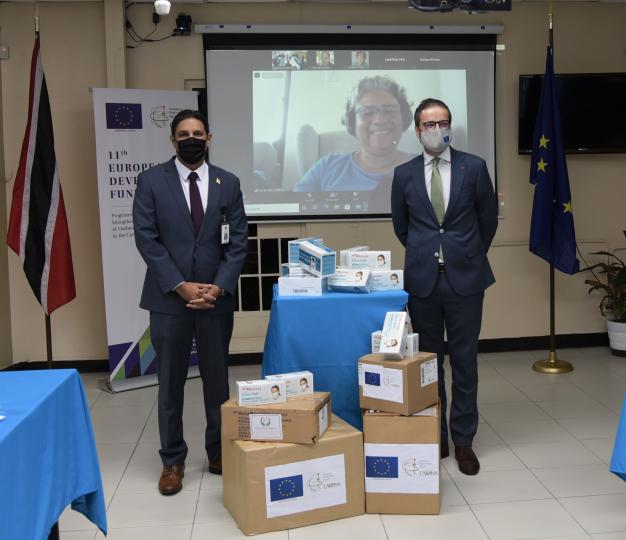RELATIONS WITH THE EU
The European Union and Trinidad and Tobago
The EU’s partnership with Trinidad and Tobago spans 45+ years. It is a mutually beneficial relationship that has evolved and become more important over time – a partnership of equals that is based not just on development cooperation and trade, but one that is also political and based on common objectives and shared values.
Political Relations
The Cotonou Agreement underpins the EU’s political relations with Trinidad and Tobago. This Agreement, signed in 2000 by the 79 African, Caribbean and Pacific (OACP) states, the EU Member States and the European Community was due to expire in 2020 but has been extended until a new agreement to replace it has been reached.
Towards a New Partnership Agreement
Negotiations towards a successor agreement began in September 2018 and ended on April 15, 2021. This Agreement, once concluded, will mark a new era for EU-OACP relations, reflecting the new world realities. The new Agreement is based on six key priority areas to address the main challenges of the future including:
- Human rights, democracy, and governance.
- Peace and security.
- Human and social development.
- Environmental sustainability and climate change.
- Inclusive sustainable economic growth and development.
- Migration and mobility.
One key advantage of the new Agreement is the application of specific protocols for each region. The Caribbean-EU Protocol therefore will address those challenges specific to the region including, climate change, economic development/diversification, security, and social development.
Trade
Trade relations between the EU and Trinidad and Tobago are based on the 2008 CARIFORUM-EU Economic Partnership Agreement (EPA). The EPA covers all areas of activity, from manufactured goods to services to intellectual property and investment, and offers Trinidad and Tobago free access for its goods and services to the EU market, while Trinidad and Tobago will gradually introduce tariff reductions for an agreed set of goods over a period of 25 years for imports from the EU. In addition, Trinidad and Tobago has bilateral investment treaties with some individual EU countries, including Spain, France and Germany.
Developing Trinidad and Tobago’s Trade Relations
While Trinidad and Tobago already exports to Europe, the EU being Trinidad and Tobago's second largest trading partner, measures are being taken to increase trade in general. The EU provides support to CARIFORUM to ensure that Trinidad and Tobago, as well as and other countries in the region, can take greater advantage of the trading opportunities available under the EPA. For example, training and workshops have been provided in areas such as food safety requirements and technical barriers to trade. Trade missions to Europe are also organised regularly.
Covid-19 Response
The immediate response of the EU was the provision of PPE, along with assistance for the health sector monitoring and surveillance, and support to vulnerable groups. The latter was channelled through an EIDHR grant contract signed with Trinidad and Tobago’s Red Cross Society, to support migrants and refugees unable to access pandemic support offered by the TT Government. Support also included a reorientation of the ‘Spotlight Initiative’ to include preventing and mitigating violence against women and girls, which has been exacerbated due to the pandemic.
Longer-term support aims to contribute to TT’s socio-economic recovery:
- A EUR 8 million programme geared towards supporting a competitive and innovative economy. The programme will become an important stimulus for the private sector in the context of the Covid-19 crisis recovery, creating and enabling the business environment to drive competitiveness and a more diversified economy in a socially and environmentally sustainable way.
- Support vulnerable Venezuelan migrant families to recover from the (mainly economic) impact of Covid-19, as part of DG ECHO’s response to the Venezuelan crisis inside and outside Venezuela.

